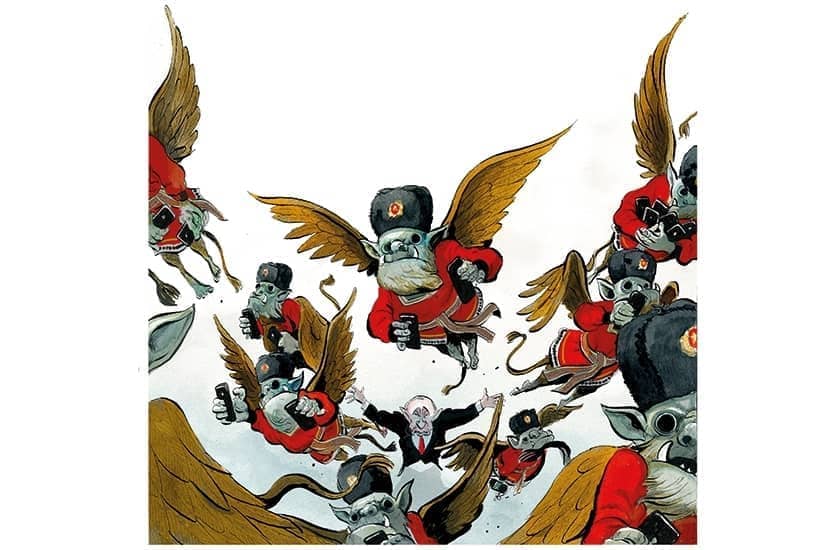Britain is not at war with Russia but in cyberspace Russian activity against Ukraine and its allies is unrestrained, as I have recently found. Indeed, it is flattering 18 years after my retirement as head of MI6 to be still considered a worthwhile target of a cyber-attack by the Kremlin.
The story of how I and a small group of pro-Brexit individuals were hacked by the Russian state and accused of plotting to overthrow the British government begins in 2017. A number of citizens, concerned that the Brexit vote of 2016 was being subverted, met in a pub to see whether they could do something about it. As a joke, they nicknamed this ‘Operation Surprise’ after the pub we were in. You might think this was a perfect example of grassroots democracy – except that nothing came of it, and the little group never met again.
However, some of the people were involved in other grassroots groups, including the website Briefings for Brexit, which is funded by public donations and run on a shoestring. It published – and still does – data on Brexit and its consequences, concentrating on economics, trade and legal issues. I wrote one or two articles for the website myself, though I was not a member of the organising group. At the time, when the future of Brexit seemed in grave doubt as the May government twisted and turned, the site was critical of the politics of the government. It may have exerted some influence by providing serious data to the press and to politicians of the kind the civil service was frustratingly not producing – either because it would not or could not. In other words, it was an excellent example of democracy in action, with a small group of citizens – some inside government, but all unpaid volunteers – giving their time and expertise to contribute to the public debate and above all to defend the democratic decision of 2016.
Now this little group, scattered round the country and very occasionally meeting in a pub, has been accused of mounting a conspiracy against the state, of trying to overthrow the government and of placing spies at the heart of Whitehall (once a spy master, always a spy master it seems) by hackers working for the Russian state.
This little group, very occasionally meeting in a pub, has been accused of mounting a conspiracy against the state
I had been aware for some time that I might be of interest to the Russians. Although there was little I wanted to hide, the thought that my online life was being tracked by a bunch of GRU (Russian Military Intelligence) voyeurs was disconcerting enough, so I took some sensible precautions to make life more difficult for the hackers. But resisting the serious attention of a powerful and predatory nation state is like sending out a pub soccer team to play Man United.
I found out in April that my emails had been compromised when an ‘investigative reporter’ sent me copies of my own emails asking for comment. The reporter’s online profile quickly showed that he was someone clearly comfortable in the warmth of Putin’s pocket.
I had been using a secure Proton email to ward off hackers (Proton being a supposedly secure Swiss email system which is meant, users beware, to guarantee privacy) but it soon became clear that the emails had been swiped from the computer of a retired professor in deepest England who I had emailed in the past.
The stolen emails were then strung together and published online in an attempt to create this dramatic scenario of farcical proportions. Which is how we were accused of mounting a pro-Brexit coup against the UK government.
Expert examination, since confirmed by Google’s security teams, indicates that this was not some spare-bedroom hacker, but an operation so sophisticated that it could only have been done by a state actor.
Given my professional formation, I am not particularly phased by this sort of thing. But for others involved it was both a novelty and provoked a mixture of anger, worry and farce. One told me it felt like being in a real-life Ealing comedy.
There is another aspect to this hack that is worth considering though. As readers will recall, the Remain media often accused Leavers of being manipulated by sinister dark forces. The most discreditable accusation made after the referendum was that Leave was being manipulated by the Russians, who supposedly wanted Brexit to happen. But now we have the Russians making considerable efforts to attack a small Brexit group and – at least objectively, as the Soviets used to say – trying to help the Rejoiner faction that is still unfortunately active.
How do we explain this? The answer is pretty obvious. Some of our Brexiteers have been quite outspoken in defending Ukraine and criticising Russian aggression. Brexiteers above all support the independence and legitimacy of the nation state, and instinctively side with Ukraine. Its striking how in Leave-voting areas, Ukrainian flags are being flown from private houses, sometimes combined with the Union Jack. Moreover, post-Brexit Britain, no longer having to toe the EU line, has led the way in its support of Ukraine, whereas the principal EU states, France, Germany and now Italy, have hung back.
My experience of things Russian derives from the Cold War and its aftermath. I am nevertheless surprised that the Russian intelligence services should now spend so much time and effort attacking a small group of private citizens. Perhaps the group had more influence on events than it realised. Perhaps it’s just another example of the Russians choosing an odd target. But the main lesson from this is that the Russians have realised, as Remainers should have worked out long ago, that Brexit is not in the Kremlin’s interest.






Comments